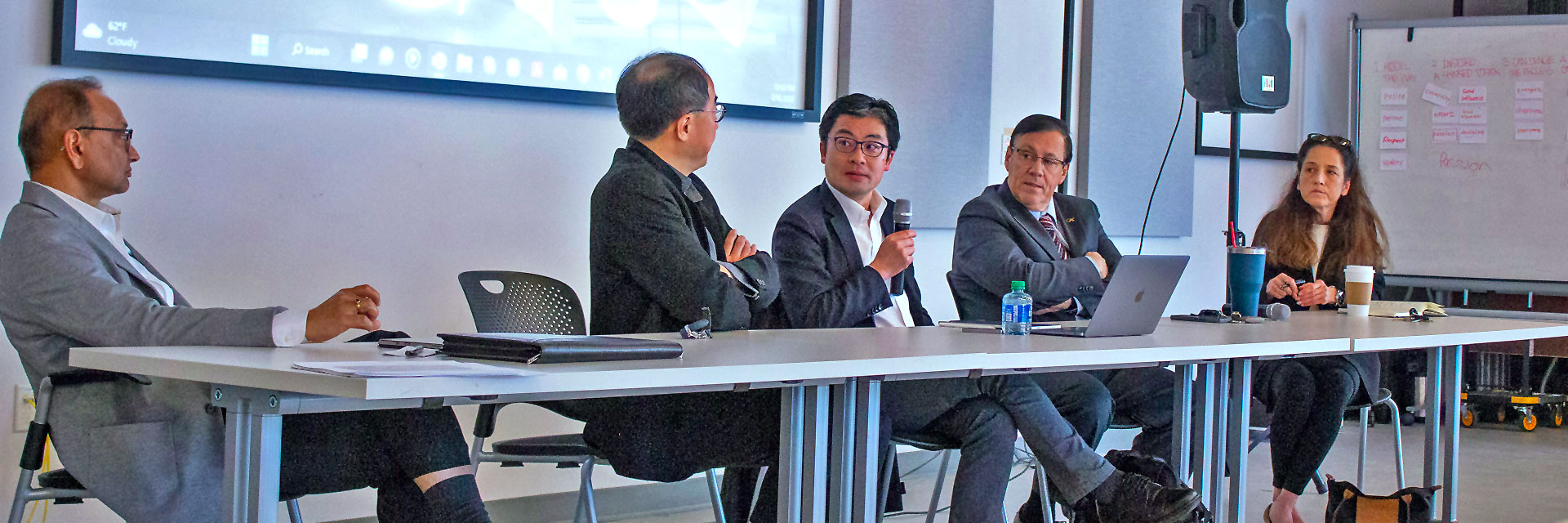
Georgia Tech Urban Research:
Smart City Design, Global Sustainability
Georgia Tech Urban Research:
Smart City Design, Global Sustainability
Wes McRae | Feb 17, 2023 — Atlanta, GA
Using a renovated 1950s-era garage that is now a LEED Platinum flexible-use office building to host a panel on sustainable smart city design just makes sense.
Faculty and students from the College of Design and the College of Engineering gathered in the Caddell Flex Space to grapple with questions raised by new urban design methods.
Inspired by Perry Yang’s urban research, the panel discussed ways city design and technology can give communities a more sustainable, resilient, and socially inclusive future. Yang is the director of the Eco Urban Lab and a professor in the School of City and Regional Planning and the School of Architecture.
Future city development is becoming much more data-driven, Yang said, and this is tied to human experiences. “Unlike the internet [era], a tabula rasa of virtual reality, the new era of internet of things creates a paradigm of placemaking, integrating the physical and digital world.”
“Future cities are shaped by an augmented environment, in which real-time interactions between humans and the physical-digital environment are crucial,” he said.
Panelists included Yang; Subhro Guhathakurta, professor and director of the Center for Spatial Planning Analytics and Visualization; Akito Murayama, head of Urban Land Use Planning Unit, Department of Urban Engineering at the University of Tokyo; Ingeborg Rocker, professor in the School of Architecture; and Dimitri Mavris, Regents Professor, Boeing Professor of Advanced Aerospace Systems Analysis, and Langley Distinguished Professor in Advanced Aerospace Systems Architecture.
Yang’s Eco Urban Lab has been collaborating with Murayama and the University of Tokyo for seven years on smart city design and urban regeneration projects in Tokyo.
Panelists explained that Georgia Tech is uniquely positioned for this type of urban research: where else will a collaboration between aerospace engineering and a campus business office fuel urban design research?
Mavris’s Aerospace Systems Design Lab (ASDL) was already working with the Navy on complex systems and sensors. “Every time you have complex systems and you have sensors, you have the ability to collect data, and then it’s the beginning of what we call ‘smart,’” he said.
“One day in a casual conversation with the Chief Business Officer here at Georgia Tech, we realized that Georgia Tech had invested in a lot of sensing for almost every building courtesty of the Olympics. That gave birth to the concept of creating a digital twin of Georgia Tech.”
The ASDL later created the Kendeda Building Digital Twin, making it possible for the Kendeda Building for Innovative Sustainable Design to be certified as a Living Building.
Tech's Sustainability Next Plan leverages the campus as a “living learning lab” and testbed for sustainability technologies. Urban research is a natural fit for this idea.
A city can be seen as a complex system of systems, Yang said. When Mavris’ Digital Engineering team looked at the Georgia Tech campus, they saw an opportunity to study that idea.
“When we were asked to do this job, we realized that Georgia Tech is really a series of networks,” Mavris said. “So it’s a system of systems, with similar challenges faced by cities, from public safety, to cost of living, pollution levels, brand new buildings mixed with existing infrastructure.”
“This would mean changing the world by looking at Georgia Tech,” Mavris said.